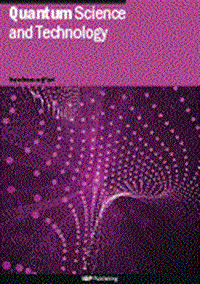Resource-efficient quantum phase estimation by randomization
IF 5
2区 物理与天体物理
Q1 PHYSICS, MULTIDISCIPLINARY
引用次数: 0
Abstract
Quantum phase estimation (QPE) is a fundamental tool in quantum computing, facilitating efficient simulations of complex problems in quantum chemistry and materials science. While most phase estimation algorithms are deterministic, recent advancements indicate that incorporating randomness can enhance performance. This study introduces a framework for randomized QPE that merges the benefits of randomized compilation with phase estimation algorithms based on quantum signal processing. Our proposed algorithms effectively reduce circuit depths by eliminating the need for precise Hamiltonian time evolution, making them advantageous for digital quantum computers estimating the eigenvalue and eigenvector properties of Hamiltonians. Notably, our findings show that the quantum stochastic drift protocol (qDRIFT)-based randomized algorithm surpasses the original phase estimation with qDRIFT, especially in scaling inverse failure probabilities. We also establish that a circuit depth of suffices for estimating M distinct observables. The protocol is executed through multiple iterations of the randomized algorithms combined with classical shadow techniques. Overall, our framework retains many advantages of the randomized compilation technique, making it a compelling solution for challenges in quantum chemistry.基于随机化的资源高效量子相位估计
量子相位估计(QPE)是量子计算的基本工具,有助于量子化学和材料科学中复杂问题的有效模拟。虽然大多数相位估计算法是确定性的,但最近的进展表明,结合随机性可以提高性能。本研究引入了一个随机QPE框架,该框架融合了随机编译和基于量子信号处理的相位估计算法的优点。我们提出的算法通过消除对精确哈密顿时间演化的需要,有效地减少了电路深度,使它们有利于数字量子计算机估计哈密顿的特征值和特征向量性质。值得注意的是,我们的研究结果表明,基于量子随机漂移协议(qDRIFT)的随机算法优于qDRIFT的原始相位估计,特别是在缩放逆失效概率方面。我们还建立了一个电路深度足以估计M个不同的观测值。该协议通过结合经典阴影技术的随机算法的多次迭代来执行。总的来说,我们的框架保留了随机编译技术的许多优点,使其成为量子化学挑战的引人注目的解决方案。
本文章由计算机程序翻译,如有差异,请以英文原文为准。
求助全文
约1分钟内获得全文
求助全文
来源期刊

Quantum Science and Technology
Materials Science-Materials Science (miscellaneous)
CiteScore
11.20
自引率
3.00%
发文量
133
期刊介绍:
Driven by advances in technology and experimental capability, the last decade has seen the emergence of quantum technology: a new praxis for controlling the quantum world. It is now possible to engineer complex, multi-component systems that merge the once distinct fields of quantum optics and condensed matter physics.
Quantum Science and Technology is a new multidisciplinary, electronic-only journal, devoted to publishing research of the highest quality and impact covering theoretical and experimental advances in the fundamental science and application of all quantum-enabled technologies.
 求助内容:
求助内容: 应助结果提醒方式:
应助结果提醒方式:


